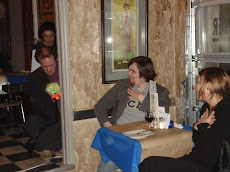
So, now well into its 3rd year, the question arises: has Café become an institution, an independent and strict form, a definitive structure, or does it remain – arguably like DaPoPo itself – an idea, or a verb, as Eric Benson, who has frequently performed at the Café, likes to put it? Are we limited by its locale, tied to Café traditions, or are discovery and departure innate?
The question is perhaps encapsulated in the ever popular menu item Pretentious-Song-with-a-Sock-Puppet. A rendition of, let's say, Schubert's definitive Lied
Der Doppelgänger, as performed by a furry green monster (a beautifully recycled slipper) is either a concession to a theatrical conceit – high art in the cloak of children's popular entertainment –, or a licence to realize the composition in this most specific of settings, or a delightfully strange hybrid.

Is the readiness to improvise a song in costume, as a so-called Conversation Piece, a professional burden, or an opportunity? When we ask an actor to sing, or a singer to act, or an actor to switch from Webster's Malfi to 80s concept rock opera, or from Chekhov's Seagull to tequila shots with wild saxophone accompaniment, is it a stylistic mess, necessarily a-jumble, or can it produce a beautifully eclectic mix, an exceptional versatility, an epicurean variety otherwise unavailble in theatre?

I believe that Café is a burst of freshness in an often stale and foul-smelling artistic milieu, governed by hype, type and cont(r)acts.
I believe that Café affords performers and audience alike a chance to take an active role in shaping an experience so often controlled from the moments the house lights dim to the
moment you find yourself expelled back onto the street after the show. It is constant rehearsal. It is always a draft. It is a model for expecting a more vital and vibrant kind of art.

The ability to sit down at someone's table and discuss Canadian theatre practice as an iteration of godlessness (that actually happened – long story), the framework for marrying scene work on classical Greek tragedy, a Jacobean revenge play and Evan Brown's scene from
13 Ways of Looking at a Madman, is a juicy opportunity the Café grants its actors, and by extension, an invitation to its audience to consider performance in its many possible, and otherwise impossible, iterations.

This dichotomy stretches to rehearsal, too: can you block a Café scene? Can you rehearse as if you were going to perform on a stage? Can you assume normal audience behaviour? Or must you develop a new set of guidelines, an untested relationship to your material? When you cannot see your scene partners, since you're crammed under a table; when you must pick up and move the keyboard while you are playing on it; and when the straight text is ordered as queer – does that ever become old hat?
I believe not. It can not, and must not. Just as a good role continues to unpack its complexities in an extended run, so does the dynamic of what we have come to call, simply, 'Café' teach us more every month. And just as Nietzsche's chaos gives birth to a dancing star, so does the confusion of Café engender a wild and wonderful ray of theatrical light.
 For Rémi's first Café experience as collaborative pianist, visit his website at http://www.rle5music.com/
For Rémi's first Café experience as collaborative pianist, visit his website at http://www.rle5music.com/


 The ability to sit down at someone's table and discuss Canadian theatre practice as an iteration of godlessness (that actually happened – long story), the framework for marrying scene work on classical Greek tragedy, a Jacobean revenge play and Evan Brown's scene from
The ability to sit down at someone's table and discuss Canadian theatre practice as an iteration of godlessness (that actually happened – long story), the framework for marrying scene work on classical Greek tragedy, a Jacobean revenge play and Evan Brown's scene from 
